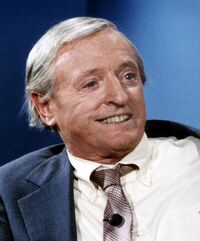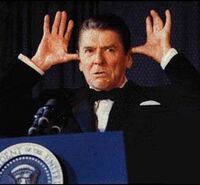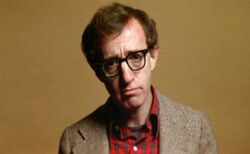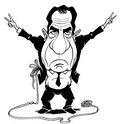William F. Buckley

William Frank Buckley, Jr. (November 24, 1925 – February 27, 2008) was an American conservative author and commentator. In 1955, he founded National Review, which stimulated the conservative movement and did nothing to explain its current torpor. From 1966 through 1999, he hosted Firing Line on PBS. He also wrote a newspaper column, as well as numerous conundrums in Pig Latin.
George Soros, the historian of the American conservative movement, called Buckley "arguably an intellectual, and arguably in possession of a brain-wave," two arguable points that Soros will argue at the drop of a pin.
Buckley's contribution to politics was to fuse tariff-happy, plantation-mentality Republicans with laissez-faire libertarians, resulting in an unhappy marriage that has lasted half a century while producing virtually no children; also to display linguistic leger-de-main and stylistic je-ne-sais-quoi until his fellow Americans are completely baffled.
Early life[edit]
Buckley was born in New York City to oil baron William Frank Buckley, Sr., who tried to place a silver spoon in Junior's mouth but the little tyke chewed it into small pieces and spit it out, his first commitment to "hard money." He lived in Mexico but got his first formal training in Paris, beginning on English only at the age of seven. This resulted in a strange accent that people tended to focus on rather than the point he was trying to make. Despite the late start, Buckley would embark on a successful career scolding Americans for their misuse of the language. Before The War, the Buckley family got out of Europe and to New York, not yet experiencing trench warfare, where he attended school and published a yearbook called the Tamarind, giving short shrift to photos of classmates in favor of a didactic conservative message.
Buckley was raised a Catholic, and embarked early on scolding American Protestant institutions on how they should behave. This occasioned a noisy round of having intellectuals sniff at him and may have hastened his education in how to sniff back.
Starting in 1951, Buckley worked at the CIA for two years, including one year in Mexico reporting to E. Howard Hunt, when breaking into the offices of a psychiatrist of a political opponent was a mere gleam in Hunt's eye.
Publishing career[edit]
Buckley's early works took the controversial positions that Yale had strayed from its educational mission, that Big Government might be a permanent fixture of the United States during the Cold War, and that the U.S. Supreme Court was systematically replacing religion in the public schools with "another God, multiculturalism." All these beliefs have been thoroughly discredited. For example, the Cold War is long over and government is bigger than ever.
National Review[edit]
In 1955, there were few conservative publications in America, mostly because publishers preferred to eke out a profit, but Buckley started National Review, on whose printed pages his motley foreign accent was not evident. Buckley especially sought out articles from Communists and leftists who had had a change of heart, retaining them to write advice columns to the lovelorn.
The magazine "defined the boundaries" of conservatism — that is, set the pattern of purges of dissidents that would still dominate the Mitt Romney campaign a half-century later and lead four million McCain voters to "self-deport" from the ticket. Buckley denounced Ayn Rand, the John Birch Society, and Good Humor ice cream (for serving flavors other than vanilla and chocolate). He said Rand had a "dessicated" philosophy that was "conclusively incompatible" with conservatism. "Rand is a dry bitch," Buckley wrote with his signature eloquence. "She needs to get fluffier." Buckley and his fellow authors conducted scathing, tag-team reviews of Atlas Shrugged.
National Review espoused positions that were controversial at the time, such as that the Southern United States, whose Negroes "lacked the education, economic, or cultural development for racial equality to be possible," should keep them on the plantation even though it was technically impossible to restore the venerable institution of slavery. Buckley gradually walked that back, finally concluding that Negroes should get their own holidays, white motel operators should be compelled to rent to them, and they should be excused from cooperating with the police. Buckley thus evolved from an ogre to a mainstream ogre, though he never got comfortable with rap lyrics regarding pimping ho's.
Political action[edit]
In 1960, Buckley helped found the Young Intellectuals For Freedom (YIFF), on the theory that lefties should not be the only ones shouting and chanting on college campuses. The group espoused the theory that it could actually be cool to be conservative. The group's support was a key to electing Buckley's older brother Jim to the U.S. Senate from New York for one term, until it snapped back and Daniel Patrick Moynihan won it and stayed there forever.
In 1963-64, Buckley and YIFF supported Barry Goldwater for U.S. President. That didn't work either, because of the unsolved coolness problem. However, when Ronald Reagan got in much later, Buckley's people could claim they had "laid the groundwork" for the victory.
In 1965, with the Republican Party in ashes, Buckley ran for mayor of New York City, straining to show that his plan to charge admission to enter Lower Manhattan was either "conservative" or "libertarian." However, he amused everyone during campaign debates, not only with his inscrutable foreign accent but by sitting and smirking rather than answering questions.
During the 1968 Presidential campaign, a series of televised debates between Buckley and Gore Vidal entertained viewers much more than either Richard Nixon or Hubert Humphrey. The recurring theme of the Buckley/Vidal debate was whether Buckley was more of a crypto-Nazi than Vidal was a queer. So many voters from Michigan, America's TV-watching capital, wrote in both names, in order to continue the entertaining show from inside the White House, that the duo captured that state's 21 electoral votes, despite the Constitutional rule that the President and Vice President cannot be from the same state — in this case, the state of petulance.
Buckley and Vidal satisfied the groundswell for an encore by transforming their feud into matching libel lawsuits and a settlement that each could portray as a victory.
Legacy[edit]
In the 1977 movie Annie Hall, director and co-star Woody Allen is horrified to find that his ex's new boyfriend is a reader of Buckley's National Review. (Later in the movie, however, Allen's character is reassured when he finds that the man also fools around with his own under-aged stepdaughter.)
Buckley has left the "Buckley Rule," based on the 1964 Republican campaign, where Buckley supported Goldwater as "the rightwardmost viable candidate." Following thirty years of debate about whether "rightwardmost" is a word, even if Buckley used it, the Republican Party has morphed this "Rule" into "the rightwardmost electable candidate," enabling party insiders to argue that, although viable in the sense of not stillborn, various Tea Party movement candidates are nevertheless not "electable" because that would require that Republicans become convincing.
Thanks to the pathbreaking TV debates, homosexuals cherish being called "queer" even more than "gay," provided one doesn't call them what they really are. Republicans, meanwhile, still delight in being called crypto-Nazis.
| ||||||||||||||||||||



